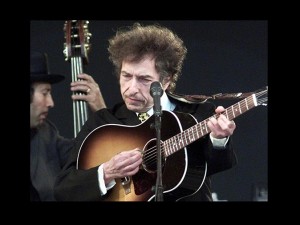A visionary trinity. ProfesSir Christopher Ricks is one of the most energetic octogenarians we have on the literary scene. Age has clearly not impaired his hearing, which has been and remains so keenly attune to the sounds and subtleties of (among others) Milton and Tennyson, that it has served as an aid for our own. Dylan’s Visions of Sin, one of his more recent hearing aids, has helped the tone deaf to attend not only to Dylan’s allusions, but also to the music in the words that themselves play as Dylan plays and pays tribute to his tambourine men. In turn, the poet has himself earned tribute, recently being awarded the nobel prize for literature. Was this supposed to be among those sins that expositor had argued the poet as envisioning?:”Literature? But he’s a folk-singer!”
Some reminders, since one of Dylan’s powers is that of a great reminder.
First, that every artist, insofar as he or she is great as well as original, has had the task of creating the taste by which
the art is to be enjoyed (Wordsworth’s conviction). Second, that the art of song is a triple art, a true compound. And it doesn’t make sense to ask which element of a compound is more important: the voice, or the music, or the words? (Which is more important in water, the oxygen or the hydrogen?) And that therefore there is a danger, even while we are very grateful this time to the Nobel Committee, if we simply allocate Dylan’s art of song to literature or Literature, of our privileging the words, as though song were not a triangle and often an equilateral triangle.
(In water, I would much prefer oxygen to hydrogen.) We must not so obtusely consider Dylan’s art by neglecting the triangle, often equilateral–acute observation. Not triangulating between those dumb of Dylan’s literary virtues (in his visions of sin) and others in praise of them, but between those in the latter group, minding us that Dylan’s genius comes in his being able to so valuably combine three mediums into a high art that reaches us all.
When Dylan sings condemned to drift or else be kept from drifting, he compounds it all, with voice and music joining with words within a different drift and drive. And his drive?
Why are you doing what you’re doing?
[Pause] Because I don’t know anything else to do. Im good at it.
How would you describe it?
Im an artist. I try to create art.More than try. The Nobel citation speaks of Dylan as having created new poetic expressions within the great American song tradition. More, even, than that.
It is the same reason why Auden hailed Professor Ricks as the “critic every poet dreams of finding,” that critics like Samuel Johnson and Christopher Ricks are so good at reminding. More, even, than that.
Read his full post at The Times Literary Supplement

